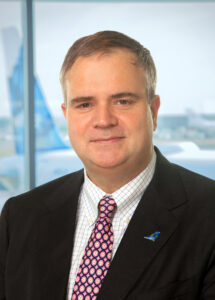Robin Hayes  is chief executive officer of JetBlue Airways Corp., which encompasses JetBlue – New York’s Hometown Airline® – as well as subsidiaries JetBlue Technology Ventures and JetBlue Travel Products. He joined JetBlue in 2008 and served as the company’s executive vice president and chief commercial officer until becoming president of the airline in January 2014. In February 2015 he was appointed as JetBlue’s third chief executive officer.
is chief executive officer of JetBlue Airways Corp., which encompasses JetBlue – New York’s Hometown Airline® – as well as subsidiaries JetBlue Technology Ventures and JetBlue Travel Products. He joined JetBlue in 2008 and served as the company’s executive vice president and chief commercial officer until becoming president of the airline in January 2014. In February 2015 he was appointed as JetBlue’s third chief executive officer.
Prior to joining JetBlue, Robin was executive vice president for the Americas at British Airways. Over the span of a wide-ranging 19-year career with BA, he also served as area general manager for Europe, Latin America and the Caribbean.
He serves on the board of governors of the International Air Transport Association (IATA) and the Wings Club as well as the board of directors at Airlines for America (A4A) and Make-A-Wish Connecticut.
Robin is a graduate in Electrical and Electronic Engineering from the University of Bath in the United Kingdom. He received a BSc and Master’s in Engineering from the university.
Arranged by Bert von Stuelpnagel
Bryan Hooper’s notes on the talk:
Robin Hayes, CEO of JetBlue Airways Corporation, spoke to us via Zoom from Key West in sunny Florida, where he had flown following the recent inauguration of JetBlue flights to that airport from New York. He recounted how almost a year ago during a meeting in London with their major aircraft supplier, Airbus, they spoke about the problem of a virus coming from China, and a week later began to feel the impact of Covid-19 on their bookings. By early April last year, 95% of bookings had been canceled and talks had been held at the White House to discuss aid for the airline industry to face the consequences of the spread of the virus. JetBlue resolved there were two main areas to focus on in meeting the challenges posed by Covid-19. Their priority was to ensure safe operations for the benefit of crew and passengers by applying appropriate precautions, such as insisting on passengers wearing masks, and using ultraviolet cleaning machines to thoroughly cleanse and disinfect the cabins. The second area of concentration was to secure financing capability to provide sufficient cashflow to weather the effects of the pandemic. Currently, the airline is flying with a sharply reduced number of flights and a lower load factor, resulting in a reduction of 60-65% from normal. During the subsequent session taking questions from the audience, Robin covered a wide variety of subjects, including plans for buying more airplanes from Airbus, including the A220-300 to replace their existing fleet of Embraer 190 aircraft, and the extended range A321 series of planes for transatlantic routes. It will be interesting to hear from Robin again next year to receive an update on the recovery from the effects of the virus on the airline industry.
